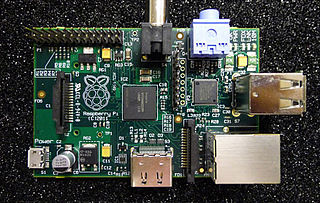Raspberry Pi: Difference between revisions
(→GHC Status: Added a link to the GHC Trac) |
Aleksandar (talk | contribs) No edit summary |
||
| Line 39: | Line 39: | ||
Potential solutions to this problem have been suggested, including using [http://wiki.qemu.org/Main_Page QEMU] on a more powerful system and thus compiling your application there and copying the resulting binary across to your Raspberry Pi | Potential solutions to this problem have been suggested, including using [http://wiki.qemu.org/Main_Page QEMU] on a more powerful system and thus compiling your application there and copying the resulting binary across to your Raspberry Pi | ||
== Books == | |||
* Heitz, Ryan [http://www.manning.com/heitz/ Hello Raspberry Pi!]. Manning Publications (2015). p.p. 225. ISBN 9781617292453 | |||
== See also == | == See also == | ||
Revision as of 17:37, 25 January 2015
This article is a stub. You can help by expanding it.
Introduction
Raspberry Pi is an ARM based single-board computer, developed for educational purposes, costing USD 25. For more details, see the Wikipedia article about Raspberry Pi, or the FAQ list.
Links
GHC Status
Of the "official" images currently available from the Raspberry Pi Downloads page, the following versions of GHC are available
Note: GHCi does not currently work on ARM, but it may become available in GHC 7.8. See this post on haskell-cafe for the status as of December 2013.
There seemed to be a point where GHCi was merged into version 7.4.2., and it may still be possible to install it in an experimental manner, but it is not (currently) available in the Debian Raspberry Pi repository. Here is a discussion thread wherein djhuk describes compiling and installing GHC-7.4.2 via QEMU to the Raspberry Pi, with incomplete GHCi functionality.
To build a cross-compiler from Linux to Raspberry Pi (running Raspbian), see the GHC Trac.
Current Issues
The main issues encountered so far is the memory limitations of the device, at 256 MB GHC will execute fine, but problems will start to arise when using cabal-install to install new libraries, especially ones with lots of dependencies. Recent model B boards have 512 MB on board [1].
Potential solutions to this problem have been suggested, including using QEMU on a more powerful system and thus compiling your application there and copying the resulting binary across to your Raspberry Pi
Books
- Heitz, Ryan Hello Raspberry Pi!. Manning Publications (2015). p.p. 225. ISBN 9781617292453
